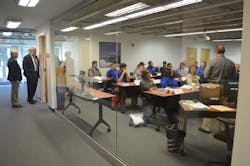Federal Aviation Administration Awards Power Plant Certification to Cape Cod Community College
After months of exhaustive review, the Federal Aviation Administration (F.A.A.) has certified the Power Plant Training Certificate module within the Cape Cod Community College Aviation Maintenance Technology Program, completing the full certification of both the airframe and power plant portions of the training program. In a message to the College community, President John Cox expressed deep appreciation for the extraordinary work done by so many within the institution to bring this program from concept to reality, one of only a handful in the entire country offering the education and training that is desperately needed within the aviation industry.
“Cape Cod Community College is now FAA certified for the Airframe and Power plant programs. I am grateful for the efforts and persistence of so many people to make today possible… It's been an amazing journey since August 10, 2012, when I walked into Cape Air for the first time to meet the airline's leaders. I left with an idea for a new program that I thought we could be teaching…I truly appreciate everyone’s patience and commitment, and our collective striving over the past 4+ years to stay focused on reaching today's achievement,” stated President Cox, who concluded, ”As in all we do, there will be generations of students – graduates – who will benefit from our achievement today.”
At this time there are two cohorts (students groups) in the program, with the first graduates expected by mid-October of this year. Located in state-of-the-art training hangars at the Plymouth Municipal Airport, the program prepares students to take separate F.A.A. certification exams in airframe and power plant maintenance and repair, earn academic certification, and transfer on for further study.
The AMT Certification Program is just the first step for those who may be interested in more advanced careers in the aviation maintenance field. It lays the foundation for an Associate of Applied Science Degree in Aviation Maintenance, and then transfer into a variety of Bachelor’s degree programs that further specialize in the aviation field.
The program’s reputation has grown rapidly outside the state, reaching of Mr. Randall Green, President of Safe Flight Instrument Corporation of White Plains, NY this past February. He was so impressed after a very thorough review of the program, that on Monday, Feb. 6, 2017, a permanently “retired” Sabreliner Model 40 twin-engine jet was flown in to the College’s Aviation Maintenance Technology Program hangar at the Plymouth Municipal Airport, a gift of Mr. Green and his company. This was crucial to the final F.A.A. certification because it provided operating jet engines that were required for power plant approval.
This program is one of only a handful of accelerated training curriculums in the country (the only one among Mass. public colleges) in which students, in slightly more than a year, can earn both certifications, and be working in jobs that routinely pay between $40,000 and $65,000 a year. While commercial aviation is the largest employer of graduates, the field includes vast numbers of companies serving fixed-wing business and corporate aviation, aviation manufacturers, helicopters, private aviation, even unmanned aerial vehicles, airships, and historic, and experimental aircraft. By one source, there are 235,000 certified mechanics working in private and government aviation right now. However, the population is aging out rapidly, and at least 40,000 new certified Aviation Maintenance Technicians soon will be needed every year.
Because of the highly specialized nature of the knowledge base and training that is part of this curriculum, there are numerous non-aviation career pathways open to those completing the program. Industries that will be waiting to employ CCCC graduates include: alternative energy (wind turbines both full size and micro turbines), transportation (subways, railroad locomotives), amusement parks that now have very sophisticated thrill rides/roller coasters, heavy equipment manufacturers such as fork lift/power lift companies, elevator companies, among others.
The program is already recruiting for the Fall 2017 Semester. More information can be found here at: www.capecod.edu/aviation
